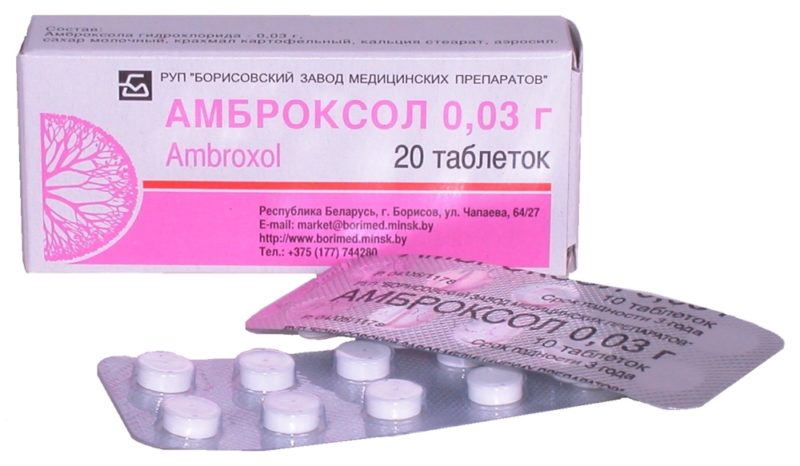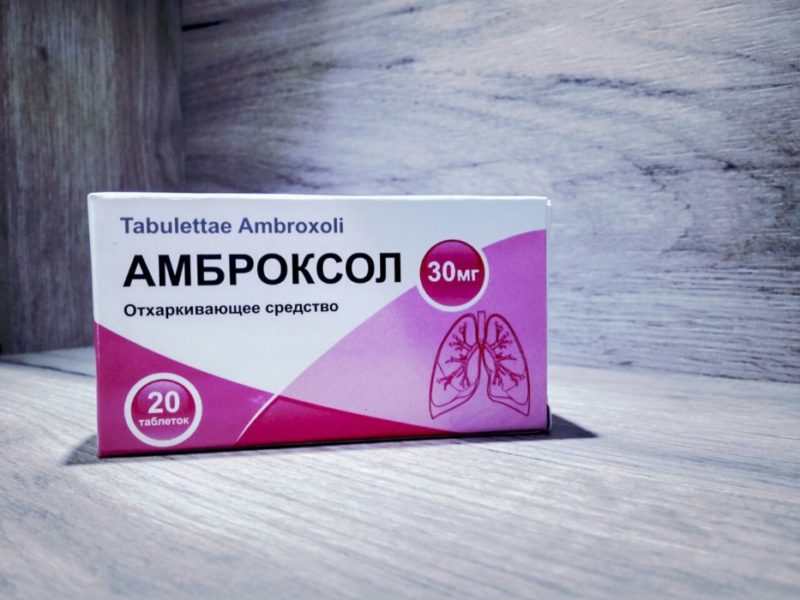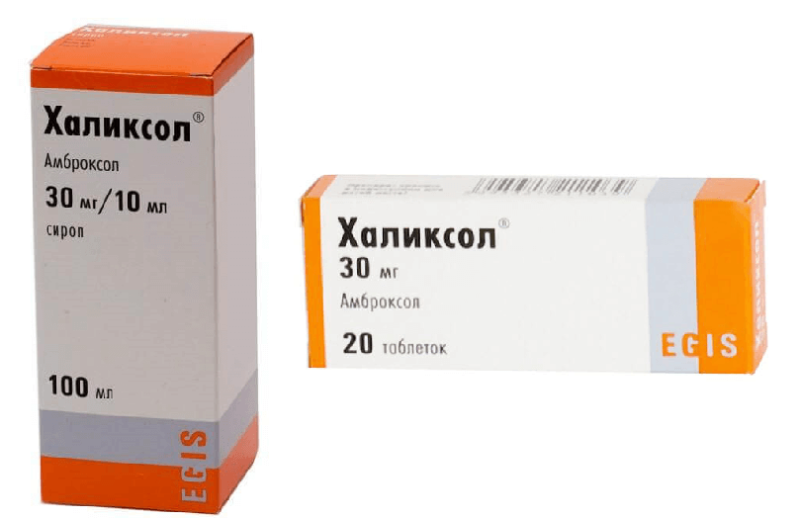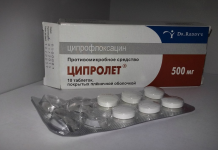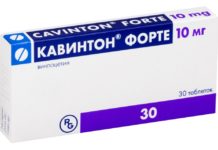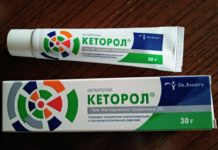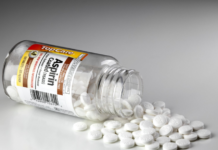At least once in a lifetime everyone has coughed. Ambroxol tablets help accelerate recovery and alleviate the patient's condition. They are approved for use in both adults and children, which makes them a universal drug for the treatment of respiratory diseases.
Material Content:
The composition of the drug
In 1 tablet of Ambroxol 30 mg of the corresponding active substance. It dilutes sputum, increases the amount of secretion and helps to remove it from the respiratory tract. Potato starch, milk sugar, magnesium stearate and aerosil are used as additional substances. They provide the desired dosage form and extend the shelf life of the drug. In a package of thin cardboard is from 1 to 5 blisters, in each of which - 10 tablets.
Indications for use of tablets Ambroxol
Instructions for use of the drug contain a list of diseases in which Ambroxol can be prescribed.
The list includes:
- bronchial asthma;
- the presence of sputum in the respiratory tract;
- cystic fibrosis with pulmonary symptoms;
- bronchiectasis;
- unspecified pneumonia;
- chronic obstructive pathology;
- acute and chronic bronchitis of unspecified etiology;
- cystic fibrosis.
In the presence of one of the indications, Ambroxol becomes the drug of choice. In some cases, it is preferable to prescribe its analogue, since the tablet form is not suitable for all patients. But the form of release does not affect the result of treatment.
Instructions for use and dosage for children and adults
Ambroxol is taken orally.The maximum effect is achieved when ingested with food. In this case, it is worth washing the tablet with two sips of water for better advancement in the gastrointestinal tract and faster dissolution.
A child from 6 to 12 years of age is prescribed a dose of 15 mg (0.5 tablets) 2-3 times a day.
For older children and adults, the medicine is prescribed according to the scheme:
- 3 times a day for 30 mg of the drug (1 tablet) for 2-3 days.
- 3 times a day 15 mg (0.5 tablets) or 30 mg (1 tablet) 2 times a day.
The course of treatment is from 4 to 7 days. In some cases, it is permissible to use ¼ tablets for children from 2 to 6 years. This scheme is used in hospitals in conditions of deficiency of syrups with ambroxol.
During pregnancy and lactation
The medicine is not used during the period of gestation or lactation. This is due to the lack of medical research results for these groups of patients. If the expected benefit to the mother outweighs the risks to the fetus, and the pregnancy lasts II-III trimester, Ambroxol can be prescribed under the supervision of a specialist.
Contraindications, side effects and overdose
Due to the tablet form of release, the drug is inconvenient to dose and take to young children. Therefore, until 6 years old they try not to use it. Due to the possible effect on the fetus, Ambroxol is also not prescribed in the early stages of bearing a child. It is important to take into account the presence of allergic reactions to the components of the drug if there were episodes of hyperreactivity during previous treatment with this agent or analogues. Contraindication is also the simultaneous treatment of antitussive drugs. This can cause accumulation of sputum in the airways and worsen the patient's condition.
In the presence of a gastrointestinal ulcer, the medicine is prescribed only under the supervision of a specialist. The same applies to patients with serious pathologies of the liver and kidneys. If they show any sign of a change in state, they should consult a doctor.
In some cases, Ambroxol causes unpleasant symptoms.
Among the side effects include:
- urticaria
- Quincke's edema;
- rashes;
- anaphylaxis;
- contact dermatitis of an allergic etiology;
- stomach ache;
- general weakness;
- bouts of nausea;
- headache;
- gagging;
- dry mouth
- dysuria;
- diarrhea
- constipation
- exanthema;
- rhinorrhea.
If one of the side effects appears, you should stop taking the medicine and consult a doctor. The same procedure is suitable for overdose. Her symptoms are considered frequent vomiting, nausea, profuse diarrhea. These patients should call an ambulance.
Analogues of the drug
Among mucolytic agents there are many analogues of Ambroxol.
Among the most popular are:
- Ambrobene syrup in a dosage of 15 mg per 5 ml of solution, 100 ml in volume, solution for intravenous therapy in the same amount of active substance per 2 ml, 5 ampoules per pack and drops for oral administration, as well as 7.5 mg inhalations per 1 ml in a vial of 40 or 100 ml;
- Halixol tablets 30 mg in 20 pcs. in a package or syrup with the same amount of substance in 10 ml, a bottle of 100 ml;
- Lazolvan syrup in a dosage of 15 or 30 mg in 2 or 5 ml of the product in a 100 ml bottle and tablets with the same concentration of 20 or 50 pcs. packaged;
- 30 mg Ambrosan tablets in an amount of 20 pcs.;
- Flavamed oral solution in a dosage of 15 mg per 5 ml, a volume of 100 ml, and 30 mg tablets of 20 pcs.;
- Ambrohexal syrup, with a dosage of 3 and 6 mg per 1 ml in a 100 ml bottle, and 30 mg tablets in a package of 20 pcs.;
- Ambrobene solution for oral administration and inhalation with the amount of active substance 7.5 mg per 1 ml, volume 100 ml, and 30 mg tablets of 20 pcs.;
- capsules of long-term effect Lazolvan with a concentration of 75 mg, 10 pcs. in a pack;
- Flavamed in the form of soluble tablets of 60 mg in an amount of 10 pcs. and a solution for oral therapy of 15 or 30 mg per 5 ml of the drug in a 100 ml bottle;
- Orvis Broncho in the form of a solution for oral administration and inhalation at a concentration of 7.5 mg per 1 ml, a volume of 100 ml;
- Halixol syrup in a dosage of 30 mg per 10 ml of the drug in a 100 ml bottle;
- solution for oral therapy Flavamed forte 30 mg per 5 ml of the drug in a bottle of 100 ml;
- syrup Ambroxol with a concentration of 15 mg per 5 ml, a volume of 100 ml.
All analogues of the drug have an expectorant effect. But they vary greatly in dosage and dosage form. Therefore, only the attending physician should select a competent replacement.
Ambroxol facilitates sputum discharge and allows you to get rid of cough and discomfort faster. But the tablet form of release is not suitable for everyone. Therefore, in some cases, the drug is replaced by analogues. Self-prescribing treatment is not recommended, since the therapeutic dose and regimen should take into account not only the patient’s weight and age, but also the particular course of the disease and the general condition of the person.


